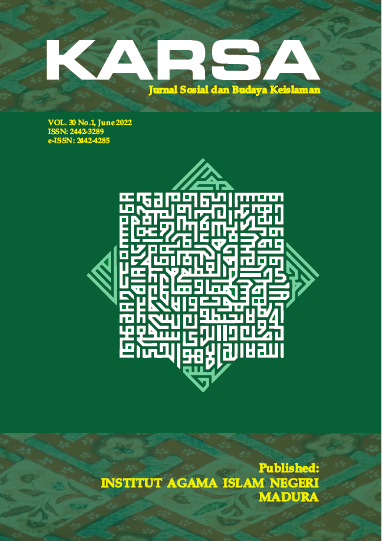Critical Discourse Analysis on Name Shifting Practice among Millennial Muslims in the Indonesian Context
 Abstract views: 694
,
Abstract views: 694
,
 PDF downloads: 627
PDF downloads: 627
Abstract
Name-giving is not merely a compilation of words to meet official record registration, yet the idea behind this has some socio-cultural values. Indonesian Muslim names have now experienced some changing from the past. This research aims at analyzing the discourse of millennial Muslim names in Indonesia. NVivo 12 Plus was used to analyze the nodes data of three categories—Pure Indonesian, Pure Arabic, and Mixing across its case—parents and children. Another analysis used was word frequency to picture the frequent word clouds used in parents' and children's naming practices. Results show a shift in Indonesian millennial Muslims' naming practice, as the Pure Arabic and Mixing categories have upward trends compared to the Pure Indonesian variety. This present research has shed a light that Indonesian Millennial Muslim parents want to pertain their children's identity as Muslims and want their children to be part of the global world.
Downloads
References
Al-Zumor, A. W. Q. G. (2009). A socio-cultural and linguistic analysis of Yemeni Arabic personal names. GEMA Online Journal of Language Studies, 9(2), 15–27.
Altan, M. X. (2006). Beliefs about Language Learning of Foreign Language- Major University Students. Australian Journal of Teacher Education, 31(2). https://doi.org/10.14221/ajte.2006v31n2.5
Aoki, K. (2012). Name and Ethnic Identity: Experiences of Korean Women in Japan. Journal of Asian and African Studies, 0(0), 1–15. https://doi.org/10.1177/0021909611419943
Aribowo, E. K., & Herawati, N. (2016). Pemilihan Nama Arab Sebagai Strategi Manajemen Identitas di antara keluarga Jawa Muslim. International Seminar Prasasti III: Current Research in Linguistics, 270–277.
Ary, D., Jacobs, L. C., Sorensen, C., & Razavieh, A. (2010). Introduction to Research in Education. United States: Wadsworth Cengage Learning.
Askuri, & Kuipers, J. C. (2019). An orientation to be a good millennial Muslims : state and the politics of naming in islamizing Java. 9(1), 31–55. https://doi.org/10.18326/ijims.v9i1.
Assaf, L. (2016). Names, Identifications, and Social Change Naming Practices and the (Re-)Shaping of Identities and Relationships within German Jewish Communities in the Late Middle Ages. 1–235.
Bailey, B., & Lie, S. (2013). The politics of names among Chinese Indonesians in Java. Journal of Linguistic Anthropology, 23(1), 21–40. https://doi.org/10.1111/jola.12003
Bates, D. G. (1994). What ’ s in a Name ? Minorities , Identity , and Politics in Bulgaria.
Bertrand, M., & Mullainathan, S. (2003). Are Emily and Greg more employable than Lakisha and Jamal? A field experiment on labor market discrimination. (76), 147–173.
Brenner, D., & Rubinstein, Y. (2012). Pride and prejudice: using ethnic-sounding names and inter-ethnic marriages to identify labor market discrimination. Retrieved from http://eprints.lse.ac.uk/48932/
Dijk, T. A. van. (1993). Principles of critical discourse analysis. Discourse & Society, 4(2), 249–283. https://doi.org/10.1177/0957926593004002006
Eslami-Rasekh, A., & Ahmadvand, M. (2015). Name-giving variations in Kurdistan Province of Iran: An ethnic identity marker categorized. Khazar Journal of Humanities and Social Science, 18(2), 5–22.
Foster, G. (2008). Names will never hurt me : Racially distinct names and identity in the undergraduate classroom q. 37, 934–952. https://doi.org/10.1016/j.ssresearch.2008.02.004
Fryer Jr, R. ., & Levitt, S. . (2004). Quarterly Journal of Economics, 2004- . Science, 3(119), 767–805.
Garrioch, D. (2010). Suzanne, David, Judith, Isaac...: Given names and protestant religious identity in eighteenth-century Paris. French Historical Studies, 33(1), 33–67. https://doi.org/10.1215/00161071-2009-020
Helleland, B. (2012). Personal Names and Identity in Literary Contexts. Oslo Studies in Language, 4(2), 273–284.
Jayaraman, R. (2005). Personal Identity in a Globalized World: Cultural Roots of Hindu Personal Names and Surnames. 38(3), 476–490.
Keyworth, D. (2002). The socio-religious beliefs and nature of the contemporary vampire subculture. Journal of Contemporary Religion, 17(3), 355–370. https://doi.org/10.1080/1353790022000008280
Khosravi, S. (2012). White masks/Muslim names: Immigrants and name-changing in Sweden. Race and Class, 53(3), 65–80. https://doi.org/10.1177/0306396811425986
Kuipers, J. C., & Askuri. (2017). Islamization and Identity in Indonesia: The Case of Arabic Names in Java. Indonesia, 103(1), 25–49. https://doi.org/10.1353/ind.2017.0001
Li, D. C. . (1997). Borrowed identity : Signaling involvement with a Western name. 28, 489–513.
Naomi, O., Leissner, M., & Researcher, I. (2017). A Jewish Rose by Any Other Name : Thoughts on the Regulation of Jewish Women ’ s Personal Names. 14(1), 1–60.
Radding, L., & Western, J. (2010). What’s in a name? linguistics, geography, and toponyms. Geographical Review, 100(3), 394–412. https://doi.org/10.1111/j.1931-0846.2010.00043.x
Rogers, R. (2004). An Introduction to Critical Discourse Analysis in Education (Vol. 3). Retrieved from http://repositorio.unan.edu.ni/2986/1/5624.pdf
Van Dijk, T. A. (1996). Discourse. Cognition and Society', Discourse & Society, 7(1), 5-6.
Vibulphol, S. A. . (2015). Beliefs about Language Learning of Thai Upper Secondary School Students in Different Educational Contexts. PASAA: Journal of Language Teaching and Learning in Thailand, 50(December), 65–94. Retrieved from https://stanford.idm.oclc.org/login?url=https://search.ebscohost.com/login.aspx?direct=true&db=eric&AN=EJ1088301&site=ehost-live&scope=site
Widodo, S. T. (2013). Modernization of Javanese Personal Names in the North Coastal Region of Java , Indonesia. Asian Journal of Social Sciences & Humanities, 2(4), 42–49. Retrieved from www. leena-luna.co.jp
Wykes, E. J. (2017). The Racialization of Muslim-Sounding Names The interaction of names , embodied identities and Islam ( religion ). (December).
Xu, X. (2018). Exploring the Logic of Name Changes and Identity Construction: A Reflective Self-Narration of Assimilation Expectations. Names A Journal of Onomastics, 68(1), 32–41. https://doi.org/10.1080/00277738.2018.1452937
Zerkina, N., Kisel, O., Mikhailov, V., & Lukina, O. (2018). Historical and Social Background of English Name Giving Process. Arab World English Journal, 9(1), 88–96. https://doi.org/10.24093/awej/vol9no1.6
Zwebner, Y., Sellier, A.-L., Rosenfeld, N., & Goldenberg, J. (2017). We Look Like Our Names: The Manifestation of Name Stereotypes in Facial Appearance. Journal of Personality and Social Psychology, 112(4), 527–554. https://doi.org/10.1093/nq/s5-XI.269.148-d
The journal operates an Open Access policy under a Creative Commons Non-Commercial Share-Alike license. Authors who publish with this journal agree to the following terms:
- Authors retain copyright and grant the journal right of first publication with the work simultaneously licensed under a Creative Commons Attribution License that allows others to share the work with an acknowledgement of the work's authorship and initial publication in this journal.
- Authors are able to enter into separate, additional contractual arrangements for the non-exclusive distribution of the journal's published version of the work (e.g., post it to an institutional repository or publish it in a book), with an acknowledgement of its initial publication in this journal.
- Authors are permitted and encouraged to post their work online (e.g., in institutional repositories or on their website) prior to and during the submission process, as it can lead to productive exchanges, as well as earlier and greater citation of published work.



















